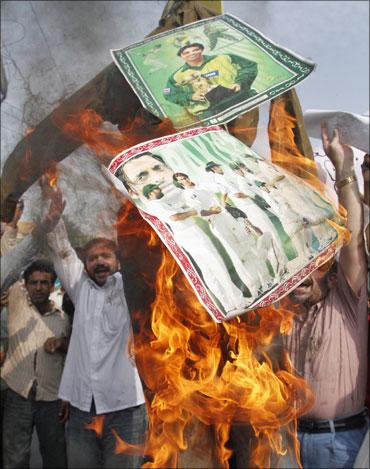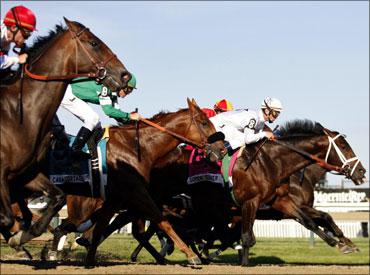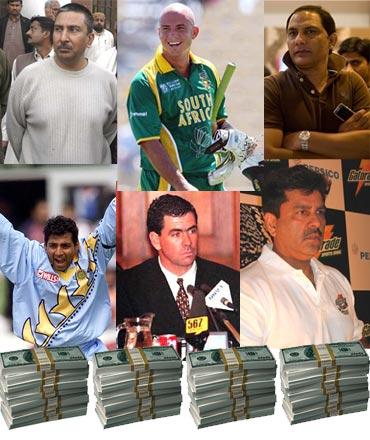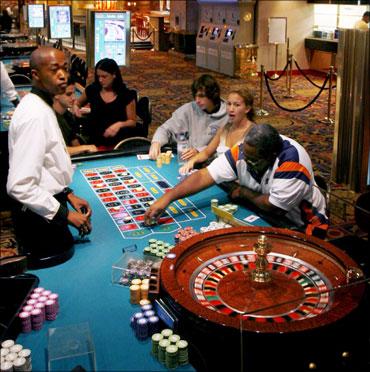Photographs: Reuters Rajeev Kumar
Gambling has been a part of our ethos since ancient times. During the Mahabharata period, there is reference to the Pandavas playing the game of dice with Kauravas.
Similarly during Diwali, Indians in many parts of our country indulge in some sort of 'gambling' activities, sometimes unaware that most of this is illegal. Currently, gambling through lottery tickets and horseracing are legal in India.
However, illegal betting in cricket and other sports like football and Formula 1 racing in India is where the big money lies and it is quite a huge, albeit clandestine, business here.
In the Indian society, there is widespread and deep-rooted belief that 'gambling' is 'bad' or 'a social evil'. Negative perceptions about the gambling industry across the population in general, as well as in media and government, have restricted the growth potential of the industry.
. . .
Why gambling, betting should be legalised in India
Image: Angry Pakistani cricket fans burning posters of cricketers allegedly involved in spot fixing.Photographs: Reuters
It is certainly true, to some extent, that uncontrolled gambling or 'addiction' of gambling is a really bad habit.
However, gambling per se is not bad. It's depends on individuals and how one 'gambles'.
According to the UK Gambling Act of 2005, betting or gambling means 'the making or accepting of a bet on the outcome of a race, competition or other event or process; the likelihood of anything occurring or not occurring; or whether anything is or is not.'
As per this definition, gambling is a 'chance' activity with a monetary value attached to it. Don't we all, in our daily lives, get involved in some form of 'chance' activity, like when we say 'today it will rain', 'tomorrow it might be sunny day', 'the train will be late by 30 minutes', etc? The only exception, of course, is that we do not attach any monetary value to our 'predictions'.
The gambling industry comes under the 'leisure' part of the travel and transportation industry. It includes sports betting, lottery, Bingo, casino, poker, horseracing and other games that might end up making or losing money for those who play it. Stakes can also be placed on activities like a war, a movie, the elections, TV shows, celebrities, etc.
. . .
Why gambling, betting should be legalised in India
Image: Horse racing is legal in India.Photographs: Reuters
Worldwide, gambling is an important source of economic activity and also of employment. According to H2 Gambling Capital, May 2010, the global e-gambling (gambling on the Internet) market is worth over $30 billion. People in countries such as the United Kingdom, Italy, etc indulge in the gambling activity for fun, pleasure and relaxation.
In terms of output and employment, in the UK the gambling industry contributes significantly. In 2008, gambling was responsible for 3 billion pounds ($4.65 billion) in gross value-added terms and helped create 40,700 equivalent jobs.
The total economic impact of the betting industry, in terms of direct and indirect influence, is to the tune of 6 billion pounds ($9.3 billion) and it also supports over 100,000 jobs in British economy.
In Europe, countries such as France and Italy are in the process of drafting laws that would allow online gambling.
. . .
Why gambling, betting should be legalised in India
Image: Some cricketers who were involved in match fixing scandal.In India, gambling-related activities could be marketed as a 'pleasure' or 'fun' part of tourist activities. South-east Asian nations like Singapore and Thailand which have much smaller number of tourist spots compared to India are able to attract more international tourists and tourism-related revenue than India owing to this very aspect.
In the beginning, some hotels in a few, selected important tourist centres in India -- like Agra, Jaipur, or Delhi, etc -- should be allowed to operate casinos, etc. This can help attract more foreign tourists and valuable foreign exchange. For this to be well regulated, local and national laws would need to be amended suitably.
Gambling laws in India are outdated and unclear. India needs to set up a national level Gambling Regulatory Authority on the lines of the UK Gambling Commission to regulate the gambling market.
The growth of the gambling industry can have a positive, multiplier effect on other sectors in the supply chain -- such as making casino games, software testing, real estate, advertising, banking and finance, hotels, cruises, pubs, etc.
. . .
Why gambling, betting should be legalised in India
Photographs: Reuters
If the gambling is legalised in a controlled manner in India, thousands of crores (billions) of rupees in black money involved in the illegal gambling activity currently could be made available to the legal economy. The Indian economy is already losing this precious revenue whether betting is legalised or not.
There is no doubt that the potential of gambling industry in India is very huge. India with her young population, robust economy and an almost superpower status in IT provides positive factors for the growth of gambling industry.
It is up to the policy makers and the Indian government to provide the right legal framework and appropriate policies to tap the huge potential of gambling industry in India.
Gambling in India is quite rampant, be it related to the monsoons or the elections or sports, even though it is considered a social evil by most. Without a strong regulatory structure to oversee this illegal activity, the government loses a huge amount of revenue that could be put to better use -- like building schools, hospitals, infrastructure, etc. Perhaps, it is time we shed our reticence on the issue.
The author is Senior Consultant-IT Services, MindTree. The views expressed here are solely of the author.






article